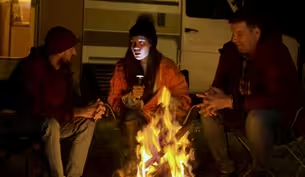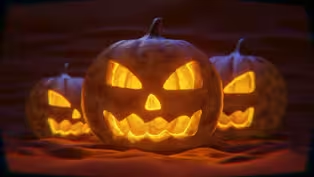
Where Did The Name Halloween Come From?
Special | 59sVideo has Closed Captions
Learn where the name Halloween came from!
Through a bizarre twist in history, the Catholic Church contributed just as much as Pagans did to the Halloween we know today! All Saints Day is also known as All Hallows Day; the night before being called All Hallow’s Evening. With a series of language corruptions throughout the following years, All Hallow’s Evening disambiguated into the name Halloween!
Problems playing video? | Closed Captioning Feedback
Problems playing video? | Closed Captioning Feedback
History in a Nutshell is a local public television program presented by SCETV

Where Did The Name Halloween Come From?
Special | 59sVideo has Closed Captions
Through a bizarre twist in history, the Catholic Church contributed just as much as Pagans did to the Halloween we know today! All Saints Day is also known as All Hallows Day; the night before being called All Hallow’s Evening. With a series of language corruptions throughout the following years, All Hallow’s Evening disambiguated into the name Halloween!
Problems playing video? | Closed Captioning Feedback
How to Watch History in a Nutshell
History in a Nutshell is available to stream on pbs.org and the free PBS App, available on iPhone, Apple TV, Android TV, Android smartphones, Amazon Fire TV, Amazon Fire Tablet, Roku, Samsung Smart TV, and Vizio.
Providing Support for PBS.org
Learn Moreabout PBS online sponsorshipMore from This Collection
History in Nutshell Shorts for Halloween.
Why Do We Like to Tell Scary Stories on Halloween?
Video has Closed Captions
One of the possible origins of telling ghost stories on Halloween ties to ancient Celts! (56s)
The History of the Jack-O-Lantern
Video has Closed Captions
Learn about where the tradition of carving faces into pumpkins for Halloween came from! (58s)
Providing Support for PBS.org
Learn Moreabout PBS online sponsorshipHow did Halloween get its name?
Through a bizarre twist in history, the Catholic Church contributed just as much as Celtic Pagans did to the Halloween we know today.
In the early days of the Catholic Church, missionaries journeyed out to convert Pagans to Christianity.
To make these conversions easier, missionaries adapted or re-imagined Pagan customs instead of outright stamping them out, however results from these early missions were mixed.
Pope Gregory III decided to officially convert the Pagan holiday, Samhain into a holiday for Christians.
November 1st was designated "All Saints' Day" a day to honor all the saints as well as Christian martyrs.
All Saints Day is also known as "All Hallows' Day", the night before being called "All Hallows' Evening" With a series of language corruptions throughout the following years, All Hallows' Evening disambiguated into the modern name "Halloween"!
Support for PBS provided by:
History in a Nutshell is a local public television program presented by SCETV

















